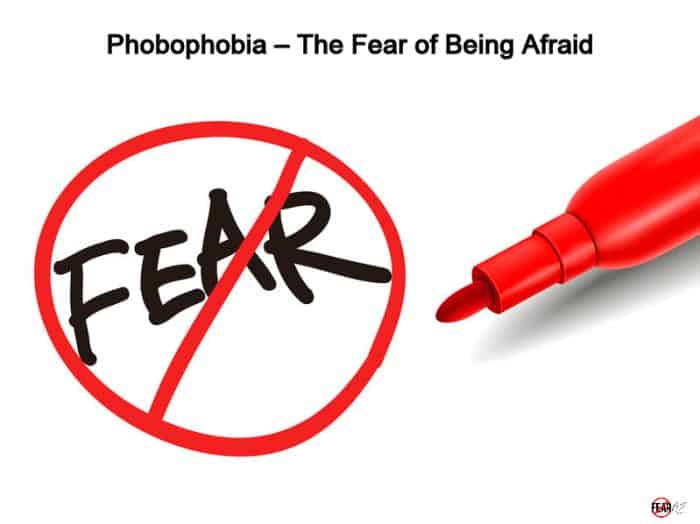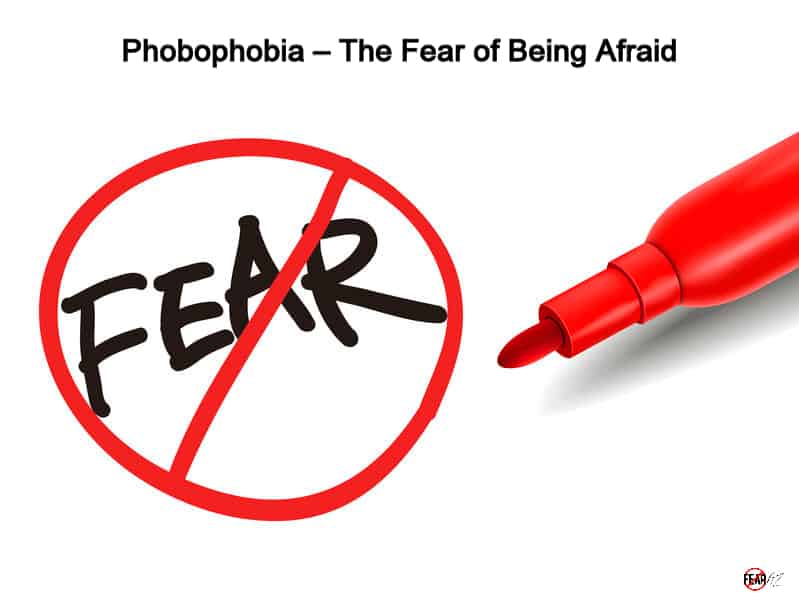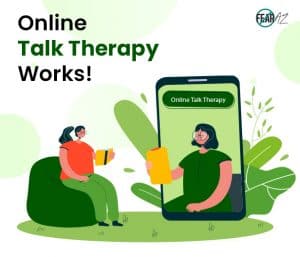Share This Article
The Fear of Fearing?
Are you afraid of being afraid? Complicated question, isn’t it? But stop and think about it.
Does the feeling of anxiety that comes with fear terrify you? If so, you may have phobophobia.
This general fear of phobias can seriously affect your quality of life. You feel scared to allow yourself to feel any fear.
Fearing fear itself or being scared that you might develop a phobia can be debilitating.
It can be difficult to explain exactly what you’re going through as most people argue that phobophobia isn’t a real thing.
But just like every other phobia, there are ways in which you can better manage phobophobia. Let’s take a deep dive into what phobophobia is and how you can deal with it.
What Is Phobophobia?
Phobophobia is the irrational fear of developing a phobia. If the mere thought of being afraid of something makes you want to avoid doing it, then you may have phobophobia.
However, just because you don’t like the idea of or are not comfortable doing something, doesn’t mean you’re suffering from a phobia of fear.
There is a fine line between disliking something and having a phobia of it.

What Causes Phobophobia?
The environment you grew up in plays a huge role in understanding how your phobia has developed. For instance, if you grew up around people with phobias, you may have started to feel afraid of developing one yourself. This anxiety would then have led you to be afraid of phobias or fear in general.
Phobophobia is a strange fear paradox. It is a vicious cycle wherein the fear of developing phobias can result in you developing a phobia.
Phobophobia may also be caused by a traumatic experience of any fear. If being in a closed room made you feel nauseous and led to a panic attack, you may never want to be in a situation where you feel that panic and anxiety again.
So, is phobophobia the same as anxiety/panic disorder?
Short answer, no. But it is easy to get them confused.
Those who have an anxiety disorder feel anxious, and there is a gradual build-up of symptoms that can sometimes lead to a panic attack. Those with panic disorder get intense panic attacks that may be triggered by feeling threatened or fear of imminent danger, even if there is no real danger present.
With phobophobia, however, you may be aware that the fear is irrational, but you still cannot stop your body from feeling all the symptoms.
Symptoms of Phobophobia
Phobophobia is not a panic disorder and it is not generalized anxiety. The symptoms of phobophobia express themselves a little differently from the symptoms of a panic disorder or generalized anxiety.
Mental/Emotional Symptoms
The mental/emotional symptoms of phobophobia include a great deal of anxiety and panic when faced with a situation wherein you may develop a fear. You may have all kinds of unexplainable thoughts about what may happen next. This can then develop into a panic that can, in turn, result in a panic or anxiety attack. You will probably feel a nagging fear eating away at your brain that just won’t go away.
Physical Symptoms
With phobophobia, you may start to feel tightness in your chest. You may also feel your throat closing up or have a choking sensation. Also, you may tend to feel nauseous or dizzy. Your body might feel weak and your mind may drift off from the task at hand. In some cases of phobophobia, people have also been known to feel breathless or have difficulty breathing.
These symptoms can be mild or intense depending on the extent of your phobia.
Self-Help: How Can You Help Yourself?
It may feel like the end of the world, being afraid of fear itself. If you feel as if your life has been ruined because of this phobia, or if you feel your fears are holding you back from exploring the things you want to, then it’s time to address it.
There is no one specific way to cure a phobia. However, there are various ways you can try until you figure out which one works for you.
Before considering going to a psychologist or trying out therapy, try to help yourself overcome your fear. The human brain is a fickle thing; it will believe what you convince it to believe. Convince yourself that you are okay, reassure yourself with kind words and actions. Treat yourself every time you successfully face a potential phobia situation. Tell yourself it’s going to be okay. The more you believe in yourself the lesser your fears.
If that doesn’t work, you could also try different methods to keep yourself calm when faced with a situation in which your fears are triggered. For example, there are multiple breathing exercises you could try. You can also try to distract yourself with other activities you enjoy. Another effective way to calm a mind full of chaos is to count sheep, or stars, or anything really. Counting helps.
Regular practice of meditation and yoga are also known to significantly reduce anxiety. Lifestyle changes such as getting more active, spending more time in nature, and exercising are also great methods to minimize anxiety.
Professional Help for Phobophobia
If self-help doesn’t work as well as you expected, it may be time to consider reaching out to a professional. Find a good therapist, and trust the treatment plan. Typically, phobophobia is known to respond well to phobia treatments. But its connection with anxiety also makes it suitable for therapies that help reduce anxiety.
Cognitive behavioral therapy (CBT) and exposure therapy are two of the most well-known treatments for treating phobia. With CBT, you learn how to change your thought patterns, thus helping to manage your symptoms.
Exposure therapy can also help with learning to face your fear with radial exposure to it.
Neuro-linguistic programming (NLP) is another treatment that has proven to be effective.
In certain, extreme situations, your therapist may prescribe anti-anxiety or antidepressant medication. In such cases, it’s important to remember to follow the doctor’s orders to the T and not to experiment with the medication. Such medication is used only in extreme cases and never for long-term treatment of a phobia.
Coping with Phobophobia
Coping with the idea of having a fear of fears is confusing enough in itself. However, once you learn to tackle it, its grip on your life will weaken. To most people, phobophobia is a very complicated subject. Some even disregard it by claiming it doesn’t exist. But it is important to remember that for someone who is experiencing a fear like this, it’s about as real as it gets.
Gaining control over your phobia of fears will take you a long way towards leading a normal and carefree life. You may not be able to completely do away with your fears, but learning to control them should be good enough to make sure you get by. When it comes to fears, it’s good to remember that it is us who controls our fears and not the fear that controls us. With that thought in mind, no fear will be too hard to take on.




